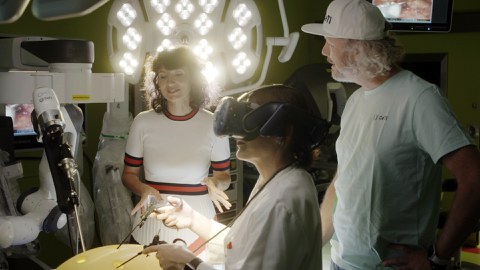Prof. Frank Fitzek
© Camera: Avanga, post production: Janett Hanitzsch
Prof. Frank Fitzek is the Deutsche Telekom Chair of Communication Networks and Speaker of the Cluster of Excellence Centre for Tactile Internet with Human-in-the-Loop (CeTI). At CeTI, scientists from the field of electrical engineering, computer science, mechanical engineering, psychology, medicine and neuroscience conduct joint research into the fundamentals of novel applications in medicine, industry and the Internet of Skills. They are investigating key areas of human control in human-machine cooperation, software and hardware design, sensor and actuator technologies as well as communication networks in an interdisciplinary way.
In the future, people will be able to interact in real time with robots or machines in both the real and virtual world. The aim of the research is to enable everyone to have equal opportunity when participating in society and to acquire essential skills - regardless of their age, physical impairments and cultural background. A crucial part of successful human-machine communication in real time involves, among other things, intelligent networks and adaptive systems. They function independently of the device used and can adapt to changing environments. By promoting technology transfer, CeTI aims to catalyze fundamental technological change while incorporating the associated social issues into these developments.
Four questions for Prof. Frank Fitzek
What do you research?
My research focus is on communication networks that are able to transport users into the virtual space - what we call the metaverse. To achieve this, it is not only necessary to transmit speech or video, as in telephony or a video conference, but also smell and touch. These human senses require a different method of communication via the network. We have to be able to differentiate between them and not just lump everything together, as this risks mixing up the feelings and sounds.
What does excellence mean to you?
Anyone working in research is breaking new ground in their specific area. I think this is what all researchers would assert about themselves. What constitutes excellence for me - after working at the Cluster of Excellence for three years now - is the ability to connect with individuals from different disciplines, find a common language, and then generate new research questions. The main thing is really about finding the right research question. Finding the solution usually proves to be easier than finding the question itself.
How would you describe the collaboration at the Cluster of Excellence?
We meet up once a week with the aim of solving any administrative or research problems that have come up. Usually we are all aware of these problems, but it is important to sit down and go over these things again, as we always find new approaches through being able to pool our diverse expertise. The discipline has not only created its own language over the last few decades, it has also opened up new areas and working methods for different topics. Sometimes you repeat yourself, or at least feel like you’re repeating yourself. But really it’s a matter of formulating the questions that you have in a more accessible or tangible way, so we can find an effective approach to answering them.
What makes TU Dresden stand out?
Although the history of TU Dresden stretches way back, it is a relatively young university with very different stakeholders in a number of fields. The good thing is that we get to bring all these stakeholders together here. They aren’t just looking to do research in their particular field, they are also wanting to tackle new topics - like the metaverse, for example. In this case, medicine answers the question as to how a person moves and what their needs are. Psychology tells us how humans react to certain errors we have in our communication network and whether we need to react to them. This close collaboration amongst the different disciplines is crucial as it stops us from building a communication network that would be oversized.


